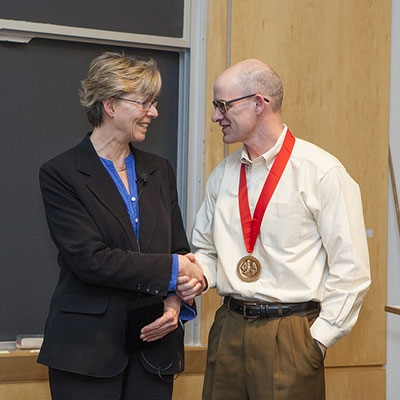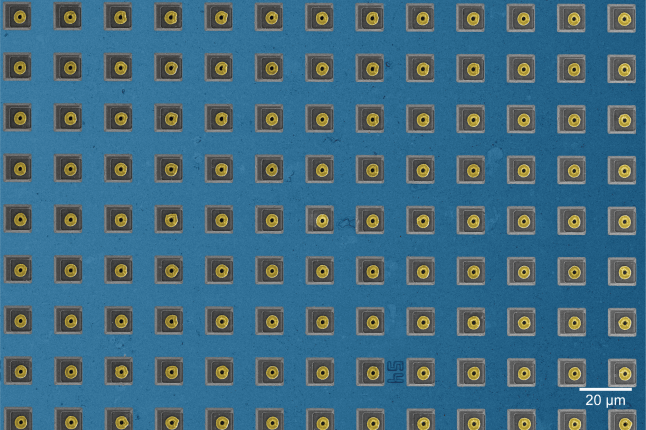News
David J. Mooney, Robert P. Pinkas Family Professor of Bioengineering at Harvard SEAS, receives the McDonald Award from Dean Cherry A. Murray. (Photo by Eliza Grinnell, SEAS Communications.)
Cambridge, Mass. – April 4, 2014 – David J. Mooney, Robert P. Pinkas Family Professor of Bioengineering, was honored today with the Capers and Marion McDonald Award for Excellence in Mentoring and Advising at the Harvard School of Engineering and Applied Sciences (SEAS).
“Dave Mooney is a world-class scientist and researcher, a superb teacher, and an exemplary mentor—to students and colleagues alike,” said SEAS Dean Cherry A. Murray.
Established at SEAS in 2008 by Capers W. McDonald and Marion K. McDonald, the award recognizes leaders in engineering and applied sciences “who, as exemplary mentors and advisors, have significantly and consistently supported the personal and professional development of others.”
Nominated by his graduate students, researchers, and support staff, Mooney was recognized for his selfless commitment to advancing the personal and professional development of those in his tight-knit laboratory community.
“Dave strives to create an environment for learning and research in his lab where everyone will feel comfortable, respected, and valued,” said one former student. “It is telling that lab alumni often maintain connections with the lab and view other ‘Mooniacs’ … as a sort of extended family, even if their time in the lab never overlapped.”
Mooney has created a collaborative and supportive atmosphere for researchers, where decisions are made collectively and performance reviews are a two-way conversation. Operating on first-name terms with his advisees, Mooney keeps it personal: successful doctoral dissertations are celebrated at his own home; former lab members return for holiday parties; and some have invited him to their weddings.
Every researcher in the lab benefits from a one-on-one meeting with Mooney every week to discuss current projects, challenges, collaboration opportunities, and skill development. He regularly helps students and postdocs to practice their presentations and chalk talks, improve their writing skills, craft persuasive grant proposals, or navigate the transition into running labs of their own.
“As I think about how to start my own career as a research advisor and mentor, I look up to Professor Mooney as the ideal role model,” said a former postdoc.
“He shows that he values the members of his lab by always being thoughtful, considerate, and respectful in his interactions with us, even when there is a difference of opinion or when he is sharing a critique,” said a graduate student. “I know that… Dave will be there to answer my questions, share his opinions, and help steer me in a direction that is best suited to my goals and aspirations.”
Nominators praised Mooney’s wide-reaching professional network and his commitment to obtaining resources to support their scientific and personal interests. During 2008–09, for example, Mooney helped a group of students launch the Topics in Bioengineering seminar series, which brings high-profile speakers to campus.
“He understands and appreciates what it is like to be a student, someone who is in graduate school to learn,” said one Ph.D. candidate. “He has never pressured me to produce data, but rather focuses on my learning experience.”
Mooney is dedicated to undergraduate education, too, teaching courses on tissue engineering as well as the junior-year engineering design course ES 96. Students in that course embark on a semester-long project to solve a problem in coordination with real-world clients; most recently, the topic was the manufacture of human cells used in medical therapies. A former teaching fellow noted that “although Dave clearly wanted the students to put together a great project by the end of the class, he also realized that the knowledge the students took away from the class was far more important than the outcome of the project itself.”
Researchers in Mooney’s lab tackle a wide range of questions in the field of cell and tissue engineering. Many studies investigate the chemical and mechanical signals that control cell proliferation and specialization, and the growth and destruction of tissue. Others design and synthesize new biomaterials for tissue engineering and drug delivery applications. In one recent advance—achieved in collaboration with the Wyss Institute for Biologically Inspired Engineering at Harvard, where Mooney is a core faculty member—the group created an implantable cancer vaccine that is currently undergoing clinical trials in human patients.
“I believe that the high level of research that comes out of the Mooney lab happens as a result of Dave’s ability to hire talented people with diverse areas of expertise,” said one nominator, “and provide them with the necessary guidance to reach their full potential.”
Topics: Bioengineering
Cutting-edge science delivered direct to your inbox.
Join the Harvard SEAS mailing list.



